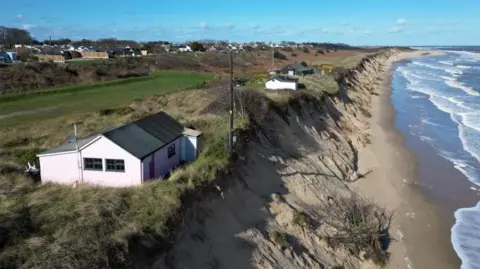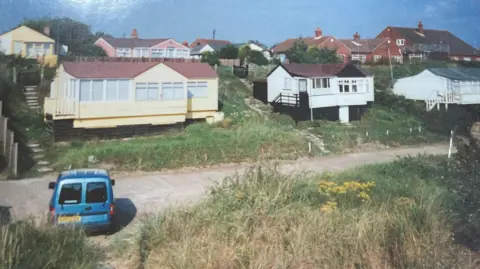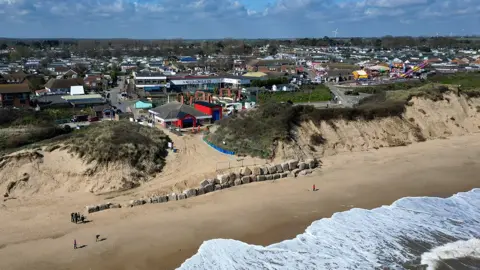Hemsby cliff erosion victims - where are they now?
 BBC
BBCEarlier this month, the small coastal resort of Hemsby on the Norfolk coast lost more of its sandy cliffs to erosion.
Two exceptionally high tides washed away several metres of land, rendering the village's local lifeboat temporarily "out of service".
In December 2023, five clifftop homes had to be demolished as they faced being swept away by large waves.
A year on, the BBC looks at where the homeowners are now, and whether they have moved on from such an ordeal.
'I'm like a prisoner'
 Andy Trigg/BBC
Andy Trigg/BBCKevin Jordan, 71, bought his 1930s-built former holiday home in Hemsby in 2009 for £85,000.
The former engineer had decided to downsize following the death of his partner, father and 23-year-old son.
"I was almost at retirement age so I wanted to get away," Mr Jordan said.
"The property seemed ideal. I could buy it outright and sit and relax on my veranda and watch the ships go by."
Fourteen years later, on 9 December 2023, a demolition team began tearing down his home, which was perched precariously close to the cliff edge.
 PA Media
PA MediaAs the remains of his home were being driven away, Great Yarmouth Borough Council housed Mr Jordan in a one-bed flat in Martham, about three miles (4.8km) inland from Hemsby.
"The last year has been awful," he said.
"I'm like a prisoner in this little, dingy flat. I've got none of my stuff, nowhere to work and the stuff I had in storage I had to sell as I couldn't afford to pay £170 a month to keep it there."
Mr Jordan said his home in Hemsby was uninsured as the costs were too high, especially given its status of "non-standard construction". He was also not eligible for compensation.
In October, he lost a High Court challenge in which he claimed the previous government lacked effective provision for the risks of coastal erosion. He has vowed to appeal.
"I don't have hobbies any more, so I just sit and look out of the window and it's driving me into depression," he added.
'I miss the beach'
 Andy Trigg/BBC
Andy Trigg/BBCMargaret Parish, 73, had owned her property on a section of Hemsby seafront, known as The Marrams, since 2004.
She had bought the small chalet for £30,000 and originally used it as a holiday home - travelling up at weekends from near Hastings, East Sussex, where she worked as a property manager.
"The sea at that time was about 100 metres (328ft) away and there was a big dune in front of me, protecting me from the sea," she said.
"In fact, when I first bought the property you could only see the sea through dips in the dune."
In 2014, Ms Parish moved into her Hemsby home full-time.
"I was pretty sure the property would be there my whole lifetime," she added.
 Margaret Parish
Margaret ParishAfter her property was torn down, Ms Parish moved to nearby Ormesby St Margaret where she had bought a home nine months prior.
She said the terraced house had been an "insurance", given the ongoing threat of erosion.
"I'm now five minutes' walk from anywhere I need to be, and the house is far better insulated than the timber shack on the clifftop," she laughed.
"But I miss waking up in the morning and seeing the sun rise over the sea.
"I also miss the beach, as I like to swim in the summer and I could just spur of the moment go down and swim.
"My heart tells me I want to be back there… but my head tells me I'm much better off."
Her property was also uninsured.
'We're planning to move back'
 Andy Sloan
Andy SloanMs Parish's younger brother, Andy Sloan, 70, bought a neighbouring property on the Marrams in the early 2000s for £15,000.
He said the chalet meant he could "get away at the weekend".
"We were always aware the beach was being constantly nibbled away," he said.
"We always thought we'd get another year out of it, but of course last winter the surge came and wiped out the road."
Mr Sloan, a sculptor who lives in Norwich with his wife, Teresa, said since their chalet was demolished they now "rarely go away at the weekend".
"I suppose it means I maintain this property more," he said.
 Andy Sloan
Andy SloanMr Sloan claimed he had spent a "fortune on insurance over the years", which only covered him for fire or an exceptional high tide, and not long term erosion.
"Moving back to Hemsby is on the cards," Mr Sloan added.
"We're going to sell our home soon to downsize now the kids have moved out, which means we could have a few quid to buy another chalet."

Great Yarmouth Borough Council, which is responsible for managing Hemsby's coastline, said continued erosion remained "inevitable", meaning more homes could be lost to the sea.
A plan for a sea defence berm stretching 0.8 miles (1.3km) along the Hemsby coastline - to protect the village from erosion - has been given a licence by the Marine Management Organisation.
The council, however, would need to find about £20m to fund it.
Following erosion earlier this month, a council spokesperson said: "No properties have been affected, but it remains the case that the dunes and beach in Hemsby are vulnerable to continued erosion.
"The council remains vigilant and continues to monitor the situation."
The Environment Agency said it was working closely with the council on how to manage the coastline.
Follow Norfolk news on BBC Sounds, Facebook, Instagram and X.
